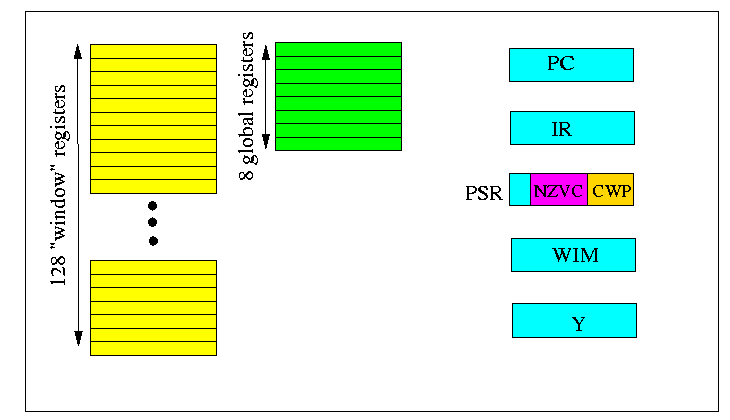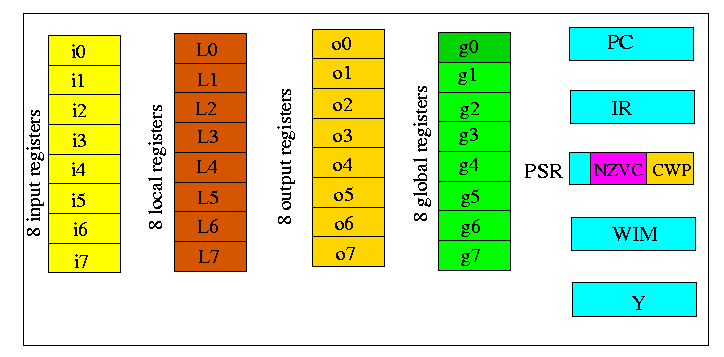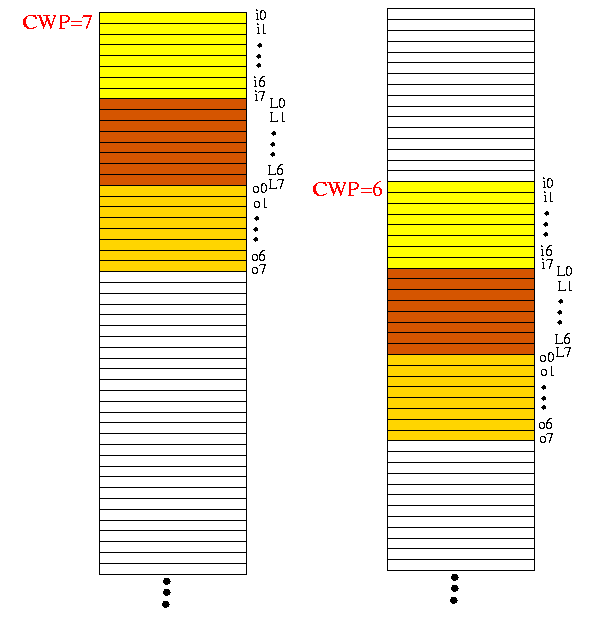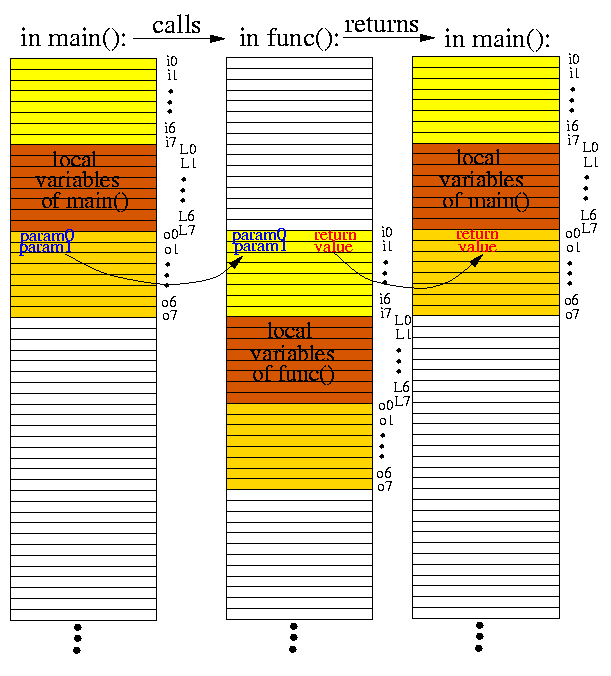
- General purpose registers:
- 128 "window" registers
- 8 global registers
- Special purpose registers:
- PC
- IR
- PSR:
- The usual NZVC flags
- The Current Window Pointer (CWP)
- WIM (Window Invalid Mask)
- Y (MultiplY)

- SPARC general purpose registers are subdivided into 4 groups:
- Input registers (i0, i1, ..., i7)
- Local registers (L0, L1, ..., L7)
NOTE: I use capital L, because lower case l will be hard to read, see: l0, l1, ..., l7 - Output registers (o0, o1, ..., o7)
- Global registers (g0, g1, ..., g7)
- g0 is a "read-only" register and cannot be updated.
- g0 always has the value ZERO (0)

- Thus: SPARC will expose a certain "segment" or "window" of registers to the programmer.
- Furthermore, the same physical register may be known by different names.
- For example: the same register is known as "o0" for CWP=7 and as "i0" for CWP=6 !
- When CWP decrements, we say that "the window moves down" and when CWP increments, we say that "the window moves up"
- The window movement has a very "interesting" effect.
- Assembler code: click here
- .gdbinit file: click here
- Get the assembler code.
- Get the .gdbinit file and rename it to ".gdbinit".
- Compile sparc-WINDOWS.s using:
cc sparc-WINDOWS.s - Run it with:
gdb a.out - Type "run" in gdb, then single step with "si"
- You should see the effect of register windows movement
- WHY moving registers up and down this way ???
- Most modern computer languages have recursion
- Compilers for languages that provide recursion will always pass parameters using the stack, even if the function is not recursive.
- Time to read/write memory (memory access time) is
much longer than the time to read/write a register
(simply because the registers inside the CPU and the memory
is far away.... electricity need time to travel from
the memory to the CPU....)
- It would be nice if there is a way to avoid putting parameters into memory when we call a function...
- Pass parameters to functions
- Reserve (private) registers that are used as local variables of functions
- Pass return value back to caller function
done in the manner as shown in the following figure:
Example:
main()
{
main's local variables;
....
return_value = func(param0, param1);
}
func(int x, int y)
{
func's local variables;
....
return(...);
}

According to the figure, we can use the window registers to pass parameters and result values as follows:
- main() passes param0 and param1 using o0 and o1 in main's window
- Then main() calls func()
- The first thing that func() must do is "move the window down".
- We do this primarily to preserve the local variable of main() and prevent it from being accessed and destroyed by func().
- However, the effect of this is that the parameters passed by main() in registers o0 and o1 are now being accessed as i0 and i1 !!!
- func() can now operate, but be aware that the parameters are in i0 and i1. func() can use registers L0, ..., L7 as local variables (these registers will not be shared)
- When func() is ready to return, it must put the return value in one of the input registers !
- Before func() retruns back to main(), it must
"move the window up" !!! (because it was func() who moved it down,
"clean up you own mess" !)
- After func() returns back to main(), main() can receive the return values in its output registers !!!
- Assembler code: click here
- .gdbinit file: click here
- Get the assembler code.
- Get the .gdbinit file and rename it to ".gdbinit".
- Compile sparc-FUNC.s using:
cc sparc-FUNC.s - Run it with:
gdb a.out - Type "run" in gdb, then single step with "si"
- You should see the sequence of events discussed above.